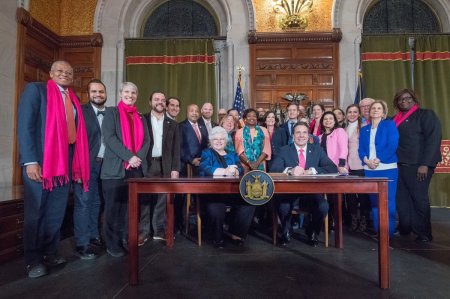New York sued over ‘dangerous ambiguities’ in liberal abortion law

A group of New York residents have filed a lawsuit against the state’s controversial abortion law, arguing that the legislation harms women, children, and viable unborn babies.
In 2019, New York Governor Andrew Cuomo signed the Reproductive Health Act into law, allowing abortions after 24 weeks of pregnancy "if the woman's health or life are at risk, or if the fetus is not viable."
The (function(w,q){w[q]=w[q]||[];w[q].push(["_mgc.load"])})(window,"_mgq"); On Jan. 22, 2019, the anniversary of the United States Supreme Court decision Roe v. Wade, Governor Cuomo signed the RHA into law. The RHA, which removed abortion from the New York criminal code, came partly in response to a concern by many that the Roe decision was going to be overturned in the near future. "The Reproductive Health Act is a historic victory for New Yorkers and for our progressive values," stated Cuomo at the time. “In the face of a federal government intent on rolling back Roe v. Wade and women's reproductive rights, I promised that we would enact this critical legislation within the first 30 days of the new session — and we got it done.” Soon after, Anthony Hobson was arrested for stabbing to death his pregnant girlfriend and killing her unborn child. However, because of the RHA, prosecutors dropped the charge of “unlawful abortion” over the death of the unborn baby. The news garnered much criticism from pro-life groups and others, who viewed the legal situation as proof that the law was failing to properly protect expectant mothers. “Thanks to the #RHA, it’s open season on pregnant women in New York,” stated New York State Catholic Conference spokesperson Dennis Poust in a post on Twitter at the time. For their part, New York State Senators Liz Krueger and Anna Kaplan, who cosponsored the RHA, rejected these claims in an editorial published by the Albany Times Union. “Physical assault resulting in the loss of pregnancy qualifies as first-degree assault, which carries a penalty of five to 25 years, far more than the previous sentence for ‘unlawful abortion,’” they wrote in February 2019. “Furthermore, judges have discretion to increase the penalty in cases where the crime was particularly violent. The RHA does not prevent appropriate charging and sentencing of violent perpetrators.”





















